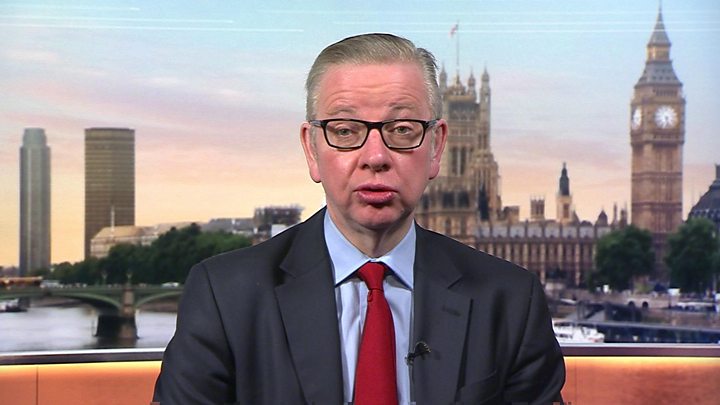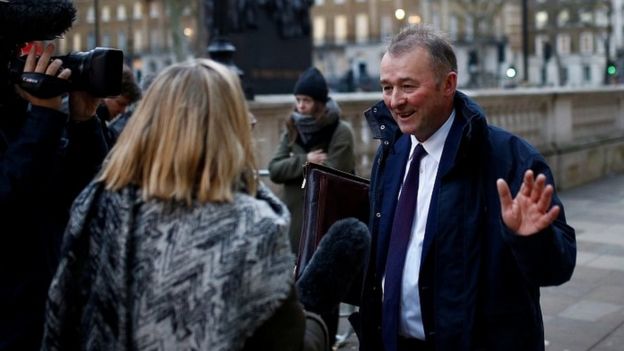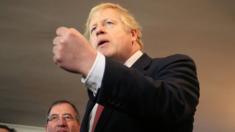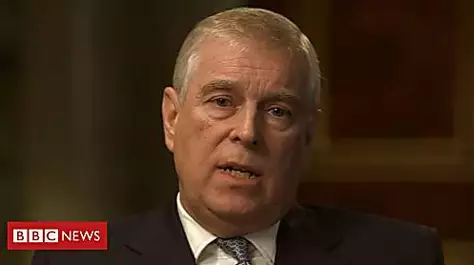
The government is to add a new clause to the Brexit bill to rule out any extension to the transition period beyond the end of next year.
The post-Brexit transition period - due to conclude in December 2020 - can currently be extended by mutual agreement for up to two years.
But an amended Withdrawal Agreement Bill the Commons is set to vote on this week would rule out any extension.
Critics say this raises the chance of leaving the EU without a trade deal.
But senior Cabinet Minister Michael Gove insisted both the UK and the EU had "committed themselves to making sure that we have a deal" by the end of 2020.
He also promised Parliament would be able to scrutinise the Withdrawal Agreement Bill "in depth".
Shadow Brexit secretary Sir Keir Starmer said the move was "reckless and irresponsible" and he argued that Prime Minister Boris Johnson was "prepared to put people's jobs at risk".
Liberal Democrat interim leader Sir Ed Davey said: "The only way Johnson can meet the December 2020 timetable is by giving up all his previous promises to Leave voters and agreeing to all the demands of the EU."
- All you need to know about the UK leaving the EU
- Could the UK and EU sort a trade deal in months?
- What does 'Get Brexit done' mean?
- What the election fall-out means for the BBC
- Who's in Boris Johnson's cabinet?
Downing Street has said the government plans to ask the new Parliament to have its first debate and vote on the withdrawal agreement - the legislation needed to ratify Brexit - on Friday.
With a majority of 80 following Thursday's general election, Mr Johnson is expected to get the bill into law with few changes in time for the UK to end its EU membership on 31 January.
The government will then have until the end of the transition period on 31 December to negotiate a free trade agreement with Brussels before the trade relationship defaults to World Trade Organization (WTO) terms.
Senior EU figures, including the bloc's chief negotiator Michel Barnier, are sceptical that a deal can be agreed within that time.
As well as ruling out an extension, the Independent reports that the amended withdrawal agreement may omit previous "provisions to ensure that workers' rights were not weakened after Brexit".
Mr Gove said workers' rights would be "safeguarded" in separate legislation adding that the government wanted to make sure the Withdrawal Agreement Bill passes through Parliament "cleanly and clearly".

Analysis

Currently, if trade talks are progressing more slowly the UK and EU could agree - by July - to extend the post-Brexit transition period by one or two years.
But on Friday, the prime minister intends to expunge this clause from his Withdrawal Agreement Bill, and instead explicitly rule out any extension.
This is designed to underline to those Leave voters who have backed his party for the first time that he is determined to deliver Brexit - and he wants to quash speculation that he would be prepared to go for a deal that keeps the UK in close step with Brussels.
Government sources say that having a hard deadline will also focus the minds of both sets of negotiators on achieving a deal.
With Labour losing swathes of seats in their heartlands, Boris Johnson will claim that the opposition haven't learned any lessons if they vote against his Brexit legislation.

The prime minister promised during the general election campaign that he would not seek an extension to the transition period - persuading Brexit Party leader Nigel Farage to stand down candidates in Tory seats.
Sam Lowe, from the Centre for European Reform think tank, told BBC Radio 4's Today programme that Mr Johnson's move was "slightly performative" and its effect would be "largely domestic".
"It is a firmer deadline but of course there is still some flexibility," he said.
Mr Lowe said a December 2020 deadline could help the PM manage his own party when it comes to making concessions to the EU.
"The prospect of a no-deal is still there," Mr Lowe said. "The question is whether Boris Johnson wants a no-deal but the evidence of recent time suggests no he doesn't."
The amendments to the withdrawal agreement come after Mr Johnson carried out a limited reshuffle of his government on Monday.
 PA MEDIA
PA MEDIA
Simon Hart has been named as Welsh secretary, replacing Alun Cairns, who quit at the start of the election.
And Nicky Morgan stays as culture secretary, despite standing down as an MP. She is taking a peerage and will sit as a cabinet minister in the Lords.
Opposition parties said she had been "rewarded for political sycophancy".
But Ms Morgan, who will be in charge of broadband and media policy, suggested she might only be in the role for a few weeks - pending what are expected to be far-reaching changes to the PM's top team after the UK has left the EU on 31 January.

What will happen this week?
Tuesday
Proceedings begin when MPs gather for their first duty: to elect the Speaker, Sir Lindsay Hoyle, who replaced John Bercow in November. Technically, MPs can hold a vote on this motion but this has never happened in practice.
Later in the day, the Speaker will begin the process of swearing in MPs, who are required to take an oath of allegiance to the Crown, or, if they object to this, a solemn affirmation. Those who speak or vote without having done so are deprived of their seat "as if they were dead" under the Parliamentary Oaths Act of 1866.
Two to three days are usually set aside for this process.
Thursday
The state opening of Parliament. The Queen's Speech is the centrepiece of this, when she will read a speech written by ministers setting out the government's programme of legislation for the parliamentary session. A couple of hours after the speech is delivered, MPs will begin debating its contents - a process which usually takes days.
Friday
Depending on how rapidly Boris Johnson wants to move, the debate on the Queen's Speech could continue into Friday.
The government will introduce the Withdrawal Agreement Bill to Parliament.
MPs in the previous Parliament backed Mr Johnson's bill at its first stage but rejected his plan to fast-track the legislation through Parliament in three days in order to leave the EU by the then Brexit deadline of 31 October.
After the debate on the Queen's Speech is concluded, MPs will vote on whether to approve it. Not since 1924 has a government's Queen Speech been defeated.

- What is the Withdrawal Agreement Bill?
- Election in maps and charts
- Brexit: What happens now?
- Labour leadership battle begins
- General election 2019: Ten lesser-known MPs to keep an eye on
- General election 2019: What is the result in my area?
- General election 2019: What's it like to lose your seat as an MP?
- General election 2019: Labour leadership takes blame over result
- Nicola Sturgeon: Scotland 'cannot be imprisoned' in UK























No comments:
Post a Comment